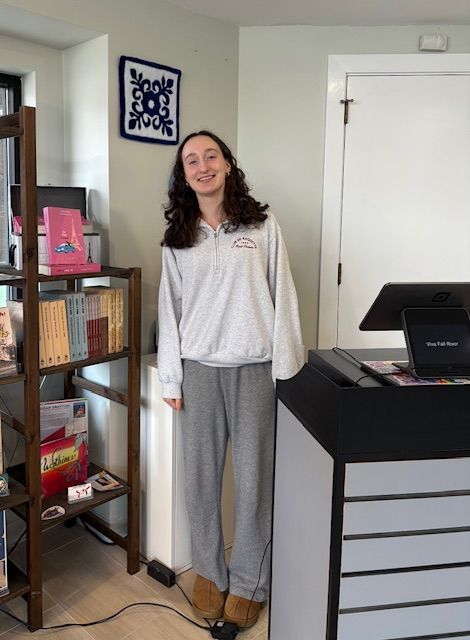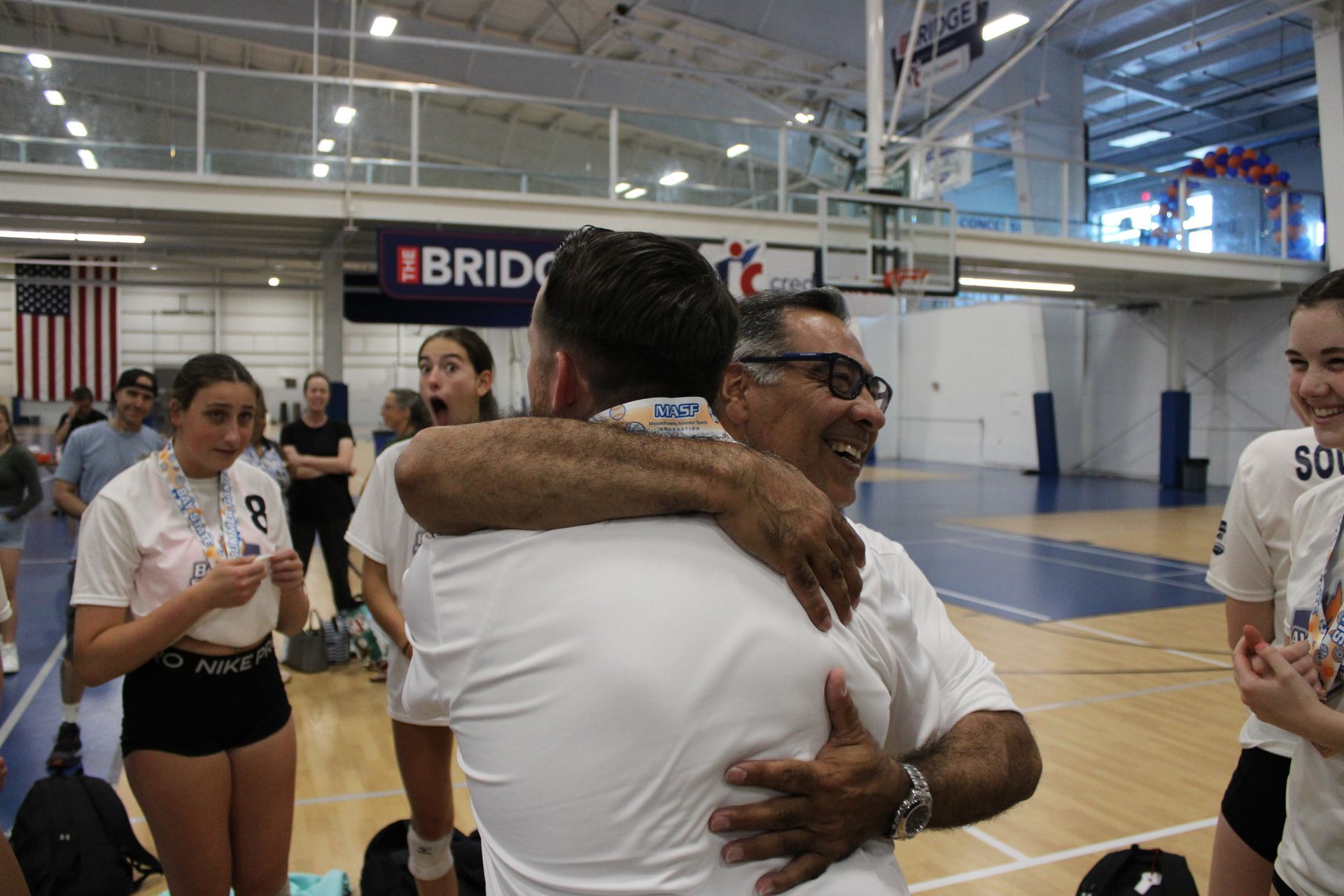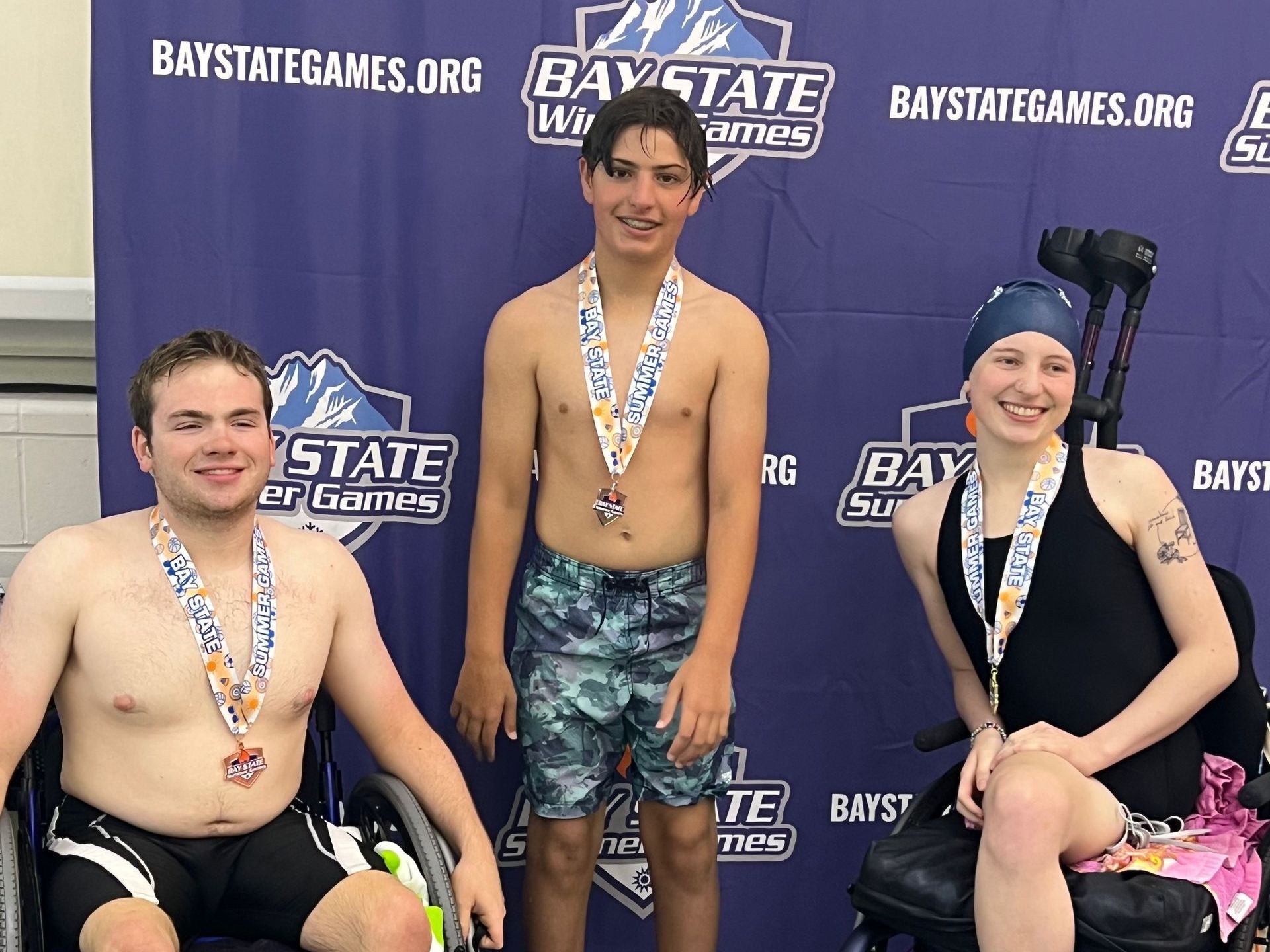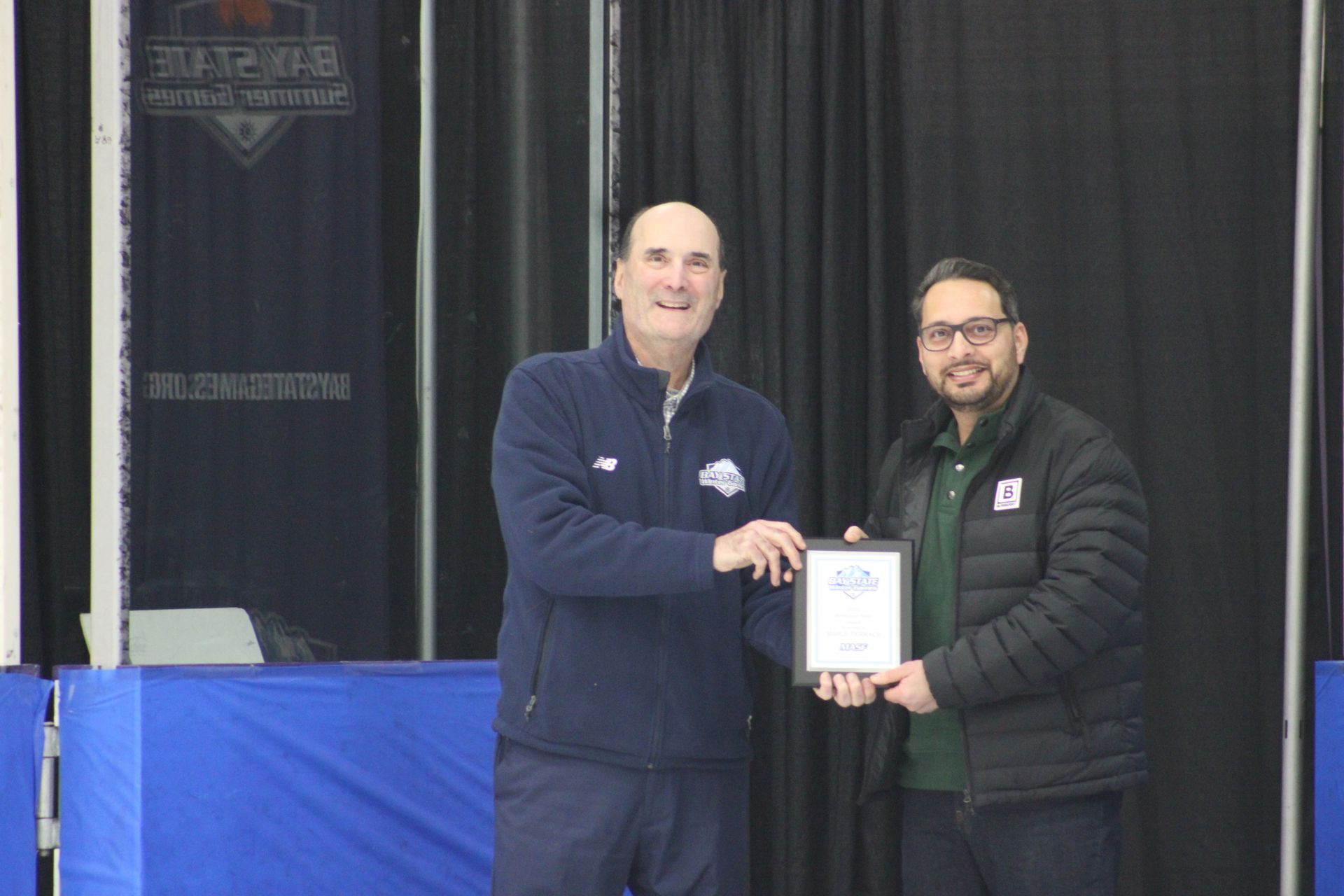A Recruiting Discussion with Elms Field Hockey Coach Katelynn Leclerc
Katelynn Leclerc is the head field hockey coach at Elms College. She previously served as an assistant coach at American International College, where she played field hockey for 4 years.
This discussion on recruiting took place on December 5, 2023 with the Bay State Games High School Ambassadors.
KL: One other thing that I wish I knew when I was being recruiting is just have an open mind. When I was looking at college, I thought I wanted a big school, far away from home, wanted all the things. I was touring colleges and I was very close to committing to Holy Cross, a bigger school, a little farther away from home, and then I was at Bay State Games as a junior and I had been reached out to by the American International coach and she really wanted me to come to her campus, kept emailing me, and I was pretty set on Holy Cross at the time and I was like, you know what, I will go and tour it just to say I did it, and I toured it, and that night I realized that was where I felt most comfortable and that is where I wanted to go. I think sometimes it’s easy to get lost in things like the social media and what your friends are doing and where they’re going and try to stay true to what you like, where you feel most comfortable and my parents always told me, “yes sports if you want to continue, it is a big part of your college career, but always be happy at a school where if god forbid you got injured, you’d still be happy there,” so that is something I always stuck with me when I was touring colleges as well, but always have an open mind, be open to new experiences, like I said, I wanted a big school at the time and went the complete opposite to a smaller school closer to home.
Any questions about the student side? One of the things you talked about, starting early, was playing in the showcases, or reaching out to coaches?
KL: I think both. So, I think when college coaches are looking to recruit athletes, letting them know where you’re playing is probably the most important thing. You can always send film, but if they have the chance to see you play in person, they’re gonna much rather that than watching film. They’re never gonna say no if you send film, but if they’re able to go or one of their assistant coaches is able to watch you play in person, it just adds that other level of connection with students as well. And I think contacting coaches, like you said, just kind of goes along with that; wherever you are playing, they might not be able to go, even if it’s livestreamed, that can be better than sending film.
And just one other question…. My experience has been that some schools and coaches are very good about video and getting video and some not as much. What resources, if you’re an athlete that doesn't have some of those resources at their school, because video is such an important part of this, what other resources are available if they don’t have those resources at the school?
KL: I think social media is very big now, so take advantage of that in the positive ways you can. A lot of people are making sport specific social media accounts where it might not be a completely streamed game that you are playing in, but just clips, for example if you are a field hockey player and you are going to the turf and shooting around and doing stick skills, you can set up your phone and just kind of record that to get a glimpse into that, it doesn’t need to be a completely streamed video of an exact game, so I think capitalizing on those kinds of opportunities. I was gonna touch on from college coach perspective, making NCSA accounts is very big, especially since there is a ton of information you can put on there. I think one of the main things to focus on is if you have an intended major. They have opportunities where you don’t …. As college coaches we can even see if we have your major because we might think you’re a great fit and start investing time with you and we don’t want to get too far down the road when the application time comes and we don’t even have your major, so to try to save time on both sides of it, I think provide as much information as possible.
How should I decide which division fits me best?
KL: So, I think, obviously I have been experienced being recruited at the division I level, playing at the division II level, and now coaching at the division III level, so I have experience at all 3. I think what it comes down to is being open minded where you feel most comfortable both athletically and academically. So, I think obviously division I is athletic based and academic based, and you don’t really have time for extracurricular school activities. If that is what you feel will be the best fit, for some people that is great. Division II is more athletically driven and academically driven with a little more time for a nice balance for both while division III is the whole package. Obviously, there’s rules for different types of seasons, division III has the least amount of restrictions recruiting wise but also playing wise. For each fall season, all divisions are gonna be pretty much the same, as well as winter and spring when those are your main priority sports. DIII, DII, and DI all differ for your offseason. Division I you’re probably going to have the most time to practice during your offseason. You’re probably not going to see much difference from in season and off season. DII you’re in season is regular, off season will have limited hours, probably 4 times per week. And DIII is only about a month and a half for your off season, so it is a little less rigorous timewise but I think finding the best balance of if you want academic and athletic, if that’s all you want, if you want academic, athletic, and some extracurricular activities, or if you want the whole package and having that time to also have jobs and things like that, there are also those different kinds of opportunities for you.
There are more questions geared at contacting college coaches. Do you first want to talk about what you look for as a head coach now?
KL: Before I started as head coach at Elms, I was the assistant field hockey coach at American International for 2 years, so having that experience to recruit to 2 different schools is pretty unique but I learned what works and what coaches all look for across the board. So, I touched on creating an NCSA profile is a big one, a lot of schools use that. It has the opportunity to post, like I said, your major, your stats, your conditioning times, anything like that, your school, contact information for your high school coaches, club coaches, it has the opportunity to upload film, it is kind of all there. Add the most information you can, because as a college coach, when we are at tournaments, we start to look people up and like I said we can see “oh they played for this school or this club and this is their major.” So, it kind of eliminates all of those steps of finding out before we start investing. Another huge thing that I recommend, you have the option to put an email in there. Make sure you put down an email that you’re checking because a lot of coaches tend to email recruits and if it’s a generic email that you put in for a tournament because you didn’t know what to put in, then that’s the email they have on file. So, if we’re emailing you because we’re interested, they might just sit there unopened. So, make sure your emails that are in there are ones that you are checking if you want to be actively recruited as well as a working cell phone number. Different coaches use different tactics. I currently work with some coaches that at tournaments they prefer to text the perspective athlete rather than emailing, so prefer to email first and then follow up with a text, so I think providing accurate information that you are consistently checking is your best chance at being recruited.
What is the bet way to get in contact with a coach?
KL: Definitely email. All schools on their website, their athletics website, will have sport specific pages, they should have a coaches tab as well, with their company or school email provided. If they do not have sport specific tabs, they will have a staff directory which will also have their email. Some things a lot of coaches like to do, when they receive an email they will set up a call with them first and see if you’re a good fit, get more information about who you are, more than just your stats, learn who you are as a person, what you are interested in and then have them come to campus and tour.
As a college coach, does it impact you any differently if you get an email from the athlete or the athlete’s parent in terms of how you react to that candidate?
KL: I mean, for me personally, at the level that we’re coaching and trying to build a culture of, we’re trying to build – I coach female sports – so we’re trying to build young women and create these responsibilities and have them become independent so something that is in our code of conduct is that now you are part of this program, we (the coaches) are only going to contact you (the athlete) directly, so we’re not texting or calling your parents saying this is the schedule for the year. It is up to you to get that information and go from there. Obviously if there is any worry academically like that, where parents and families need to start getting involved, I’ll go from there, but for the most part we are looking to contact with the student because as much we are recruiting your family that comes along with coming to this school, but we’re focused on developing and creating and growing you as individuals.
What do you look for as a coach that should be included in the email (you receive from an athlete)?
KL: Definitely what position you play. Obviously, you’re emailing a college coach, you don’t need to say your sport. But your position, your high school, intended year of graduation, and if you do know what you want to major in, you can include that as well.
Something if you’re depending on what time you’re emailing your coach, you could also include upcoming games if they are local and you know they are able to attend. You can also provide “these are some of my games coming up, I’d love to have you” and include contact information, like a cell phone number.
If I email a coach and they do not respond, should I give up on that college?
KL: I would definitely not give up. I would email again. There are sometimes, like I said, an email that was given by a recruit was not a valid email, so if you can find a new way to contact them, definitely try that out. Admissions at a college do a great job connecting prospective student athletes to college coaches as well. If you cannot get in touch with a coach, it could have gotten lost in the email chain, or anything like that. If you reach out to admissions and show interest in the college, most, if not all colleges will make an interest sheet with who the prospective student is and if they are interested in a specific sport and those specific sports get sent to the specific coaches. I would follow up with an email directly, like I said if you find contact information, most times there will be an email for a coach as well as a phone number. Sometimes that’s an office number, sometimes it’s a cell phone number. If that doesn't get you anywhere, definitely reach out to admissions because they do a great job working hand in hand with athletics to make sure that they even know if people who might not be recruited by the coach but are coming to the institution and want to play as well.
What do college coaches look for in a student and an athlete?
KL: Definitely time management. I think being able to have those skills is very important and being able to adapt. I think a lot of times, that transition from high school to college can get really tricky especially if you are a fall sport coming in for your season a little early. You’re in for preseason and all you’re doing is your sport, so life is great, and then you’re there for 2 weeks and then classes start and you’re like what’s going on, I thought I was just playing my sport forever. But I think being able to adapt and being able to use all of your resources is something that coaches look for. When you’re attending colleges, they have a ton of resources that you are essentially paying for, it’s built into your tuition but making use of all of those resources is just going to benefit you {in school} as well as your whole career.
What do colleges offer, not just to athletes? What resources are available to all students?
KL: Especially academically, like tutoring and study hall might sound boring and you might not need it, but having that scheduled time, especially when you are a student athlete, just carving out that time where you’re able to go and have that people to check in and make sure you’re going, it just helps with that time management. It doesn’t have to be those resources that help you academically or athletically, but if they’re holding events so you can kind of have that whole college experience. For example, the team that I coach currently, they love to go to bingo. They go once a month as a team. So, like making use of all of the resources that your school is providing because like I said, it is built into your tuition, so if you’re paying for it, you might as well use it. A lot of colleges also provide writing center help, like I said that transition from high school to college can be tricky, especially for your English classes, writing styles, they do provide writing centers that help you with different writing centers with what are recommended for your classes.
How often should I be contacting coaches and what else should I be sending them other than game footage?
KL: I would say once you are getting recruited, college coaches will tend to check in on you. Obviously recruits may be texting me and checking in to see how things are going, I am not going to ignore them, having that relationship is important but I think especially being a college coach, when you are in season, I’m not going to be texting you every day to say “how’s it going, how’s it going?” I think I try to do a good job in texting and checking in on seasons and things like that, so if you want to remain in contact with a college coach that you are looking to attend their school, you can look up their schedule, and if they win, you can send something simple like congrats on the win, I watched your game, so that way you can remain in contact, it doesn’t need to be always professional and things like that. Just make sure you are still establishing that relationship even after you’re committed to a school, you can continue to build that relationship because you will be attending there. Like I said, it doesn’t need to be as professional in an email every time if you just shoot them a text, “congrats on the win”, “good luck today”, “saw the score,” things like that, it goes a long way for the coaches.
Are there any things that are important than need to be done early in your high school years that will help you in getting recruited for college?
KL: I know all of your guidance counselors say it, but your grades definitely matter. A lot of time, you don’t pay attention to it much until the application process, but your grades through your entire high school career all get put into your transcript. That can hinder your academic standing when applying. So, I think really focusing on that academic side is gonna be very important. It might not seem like it right now but that is obviously one of the most important things because if your GPA is on the lower side, it may hinder acceptance and then you won’t be able to play a sport either way. Making sure you’re on top of your grades but making sure you are in communication with your guidance counselor about sending things in when it comes time for your application process as well.
I think like Erika (BSG Director of Communications) said, there have been a lot of Bay State Games alums that gone on to play in college and utilizing those connections because people have gone through the process they kind of know what to look for, what to send to college coaches, so just network if you guys play clubs or AAU or travel as well, utilize those coaches because they probably experience their other athletes continuing on to play in college. Just make those connections. More times than not, if you know them, their coach or a college coach may have a connection to the high school. So, it’s just about utilizing your resources
Erika: absolutely. If any of your teammates too, like Katelynn said, that you played with in the showcase that are going through the recruiting process or are already playing in college, they would be a great resource to reach out to.
KL: Kind of going on how often to contact coaches, something that I instill in my recruits when I am talking to them is an open lines of communication. It comes with a lot of – I don’t want to say pressure for recruits, but you’re going through a time where are trying to find the best fit for what you want. So, it’s gotta be the best fit academically – they have to have your major – it has to be the best fit socially where you are comfortable, and also if you are an athlete, where you feel the most supported and where you thing you are going to be the most successful. If you are talking to multiple schools, it kind of gets to be a lot. You shouldn’t feel any pressure to tell a coach “no.” because at the end of the day, it’s your life, it’s where you are going to school. So, I tell me recruits an open line of communication, so that means if you don’t want to go to school where I am coaching, I am completely ok with that because it’s your career, it’s your life, it’s where you feel most comfortable. But you can tell me that and you should tell a coach that so they are not wondering in May are they coming? Are they not? Because no coach is going to be made so that you are choosing what is best for you. So even if you do choose to go to that school, great, you should call them, text them, that you are committing or not but if coaches are checking in, don’t just respond to them because you are scared to tell them you are committed to another school. Tell them thank you for your time, showing your interest, but this is not the best fit for me. More times than not, the coach will say “thanks for letting me know. Wishing you all the best. Let me know if anything changes.” So, it shouldn’t be scary, I don’t want to tell a coach no, because at the end of the day, it is your decision and where you feel you are going to be the most successful.
Erika: That is some really good advice.
KL: I think when I was being recruited, I kind of went through, you feel a lot of pressure you have to figure out what you want, and I think being a people pleaser, you don’t want to tell them no, but you can’t go to 5 schools at once. So, I think that you have to be upfront, and I try tell my recruits, when it comes time they will be making their decision, just let me know either way. I am not going to force you to come to this school if you’re not completely happy or invested because if that happens, you might only stay there for a year and want to leave.so I think, don’t be afraid to say no but also let them know so they’re not continuing to reach out to you asking when you are playing again, how’s it going, if you’re entertaining that if you’re already committed to another school.
When can college coaches start looking at you?
KL: So at tournaments, or any time of games like that, they can see you, it’s just a different contact period. Division I can start your junior year, and that’s the same at division II. So, it’s I want to say the spring of your junior year, I can look up those dates, in your junior year, you can continue to contact them, but they cannot reach out to you. For DI and DII. So, if you email a coach your sophomore year, they’re not ignoring you, they’re just not allowed to contact you. Division III is the most lenient, where they can contact you at any point. Obviously with commitment, you don’t apply until senior year, but you can talk to them, and they can answer you as well. But if you are looking to play Division I or Division II and you’re emailing them and you’re like this coach isn’t even emailing me back, they must not be interested, they just can’t contact you
Erika: All of those resources can be found on the NCAA website. If you look up the recruiting rules and like those dates when they are allowed to communicate, all of that information can be found on the NCAA website. It’s really helpful to just understand from the coaches’ perspective what the recruiting process looks like.
KL: and they also have down periods as well. So even if you are a junior or senior getting recruited there are what they call dead periods where they are not allowed to contact you. I want to say it’s a time within November. So, if you are sending emails, like Erika said, looks at those resources to see if it is a dead period before sending like 50 emails to them asking if they are still interested.
What is your advice to our ambassadors if they are interested in a school, but the coach hadn’t contacted them first. You know it’s great when the coach reaches out first and maybe you’ve never heard of the school, so you look into it. But you have your dream school, but the coach hasn’t reached out yet, what do you do?
I would say definitely reach out because it could be an oversight. They could have not gone to a tournament you played at. A lot of coaches, if they are recruiting you, it because they had seen you play. They could have just not seen you play. You could have been at a tournament that’s on 6 different fields and they just didn’t get to your game or they just didn’t upload your name because it was a mistake or they missed it. But if you’re interested in a school, definitely email. A lot of times, it could have been an oversight, they could have just not known. If you email them and you’re local to that college, they’ll likely make time to see you play. That doesn’t mean you’re a recruited athlete because they’re gonna see if you’re the best fit as well.
When you talk about contacting coaches, I think one difference I’ve seen too, there are less coaches in Division III as there are in Division I in terms of coaching staff sizes. When these guys are looking on the website and they are looking at all of these coaches, should the email go just to the head coach, to the assistants? Some schools have a director of recruiting, who is the best person to send it to?
I would definitely send it to the head coach. You can cc the assistant because – I think someone before asked if a college coach doesn’t email you back should you give up, NO, because if a college coach, like I said they could have lost sight of the email but if you include the assistant or the recruiter, they might be able to send it along to the head coach just if case they didn’t see it and then “oh there it is” so the more people the better. I don’t think you should be including the entire athletic department, but I think definitely include the head coach and the assistant if that is listed as well and if you cannot get in touch with them that way, admissions does a great job communicating with the coaches if there is interest in sports.











